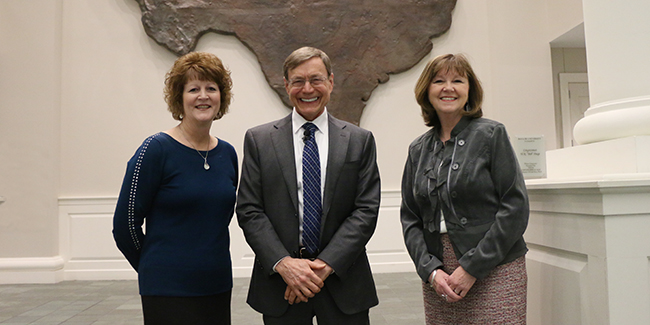
Dr. Douglas Clements with math education professors Dr. Sandi Cooper (left) and Dr. Trena Wilkerson (right)
Early childhood learning expert and professor Dr. Doug Clements believes that teaching early mathematics is more than helping kids remember numbers. Childhood mathematics skills are a foundation for success that is often overlooked by teachers, he said.
Clements delivered a lecture titled “The Surprising Importance of Early Math” on Monday evening at Baylor.
“One of the most surprising lessons we can learn is that kids are often able to handle learning better than we give them credit for,” Clements said.
A professor and Kennedy Endowed Chair in Early Childhood Learning at the University of Denver, Clements focuses on connecting research to early mathematics to make classes more dynamic.
 “With Doug’s experience as a kindergarten teacher and years of research in this field, he is the leading expert in early math learning,” said Sandra Cooper, PhD., professor of mathematics and Coordinator of Mathematics Education Program in the Department of Curriculum & Instruction.
“With Doug’s experience as a kindergarten teacher and years of research in this field, he is the leading expert in early math learning,” said Sandra Cooper, PhD., professor of mathematics and Coordinator of Mathematics Education Program in the Department of Curriculum & Instruction.
Clements shared teaching and differentiation strategies with the Baylor School of Education students, faculty and local educators through specific examples. He has collected helpful research videos illustrating the impact of different teaching strategies. The audience had time to observe the different methods of learning and talk through them with Clements.
Clements shared his approach of creating curriculum and evaluating student succcess through technologies and specific trajectories, or goals.
Some of the examples showed students learning successfully through completing various activities. In others, children were making similar mistakes over and over because they weren’t able to make larger connections. It’s natural that everyone learns a little bit differently, Clements said, but the key is finding how kids learn best and then pushing them.
Clements shared the story of preschool teacher Meg Johnson, who was able to evaluate her young students’ abilities and adapt individually to help foster their growth. Johnson took the time to plan small activities for each student, recognizing that not everyone in her class was at the same place.
“These are some activities I can use to push them a little bit harder,” Clements said. “That’s a beautiful statement of learning adaptations and using learning trajectories.”
That message struck a chord with senior secondary math major Rebekah Tate. “That lecture reminded me a lot about how I learned, and it made me wanted to learn more about the connections of learning and styles of learning,” Tate said.
Tate said she sometimes notices kids in her class struggling in certain areas, and now she’s motivated to learn the root of the struggle. As a senior, Tate is a full-time student teacher in a local school.
“Dr. Clements helped me understand why some students excel in math early on or why they don’t,” she said. “For my students now, I want to be able to see where they are and understand the process of how they got to where they are.”
Although Clements specializes in mathematical education, he said it’s not surprising that mathematics are a foundational learning tool, whether it be counting or geometry.
Young children can do math, they just have to be challenged to work at it, he said. Once they build up their confidence in learning math, the doors open for other subjects.
— By Olivia Berry
For more news from Baylor School of Education, visit the Instant Impact home page.
ABOUT BAYLOR SCHOOL OF EDUCATION
Founded in 1919, Baylor School of Education ranks among the nation’s top 20 education schools located at private universities. The School’s research portfolio complements its long-standing commitment to excellence in teaching and student mentoring. Baylor’s undergraduate program in teacher education has earned national distinction for innovative partnerships with local schools that provide future teachers deep clinical preparation, while graduate programs culminating in both the Ed.D. and PhD. prepare outstanding leaders, teachers and clinicians through an intentional blend of theory and practice.
ABOUT BAYLOR UNIVERSITY
Baylor University is a private Christian University and a nationally ranked research institution. The University provides a vibrant campus community for more than 16,000 students by blending interdisciplinary research with an international reputation for educational excellence and a faculty commitment to teaching and scholarship. Chartered in 1845 by the Republic of Texas through the efforts of Baptist pioneers, Baylor is the oldest continually operating University in Texas. Located in Waco, Baylor welcomes students from all 50 states and more than 80 countries to study a broad range of degrees among its 12 nationally recognized academic divisions.
